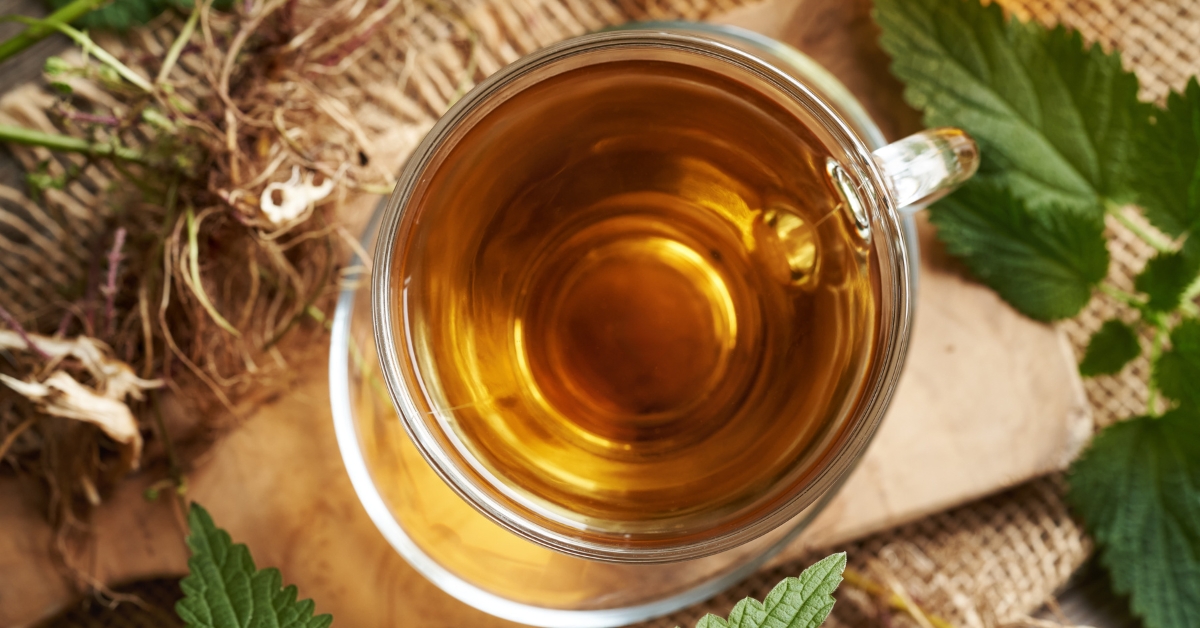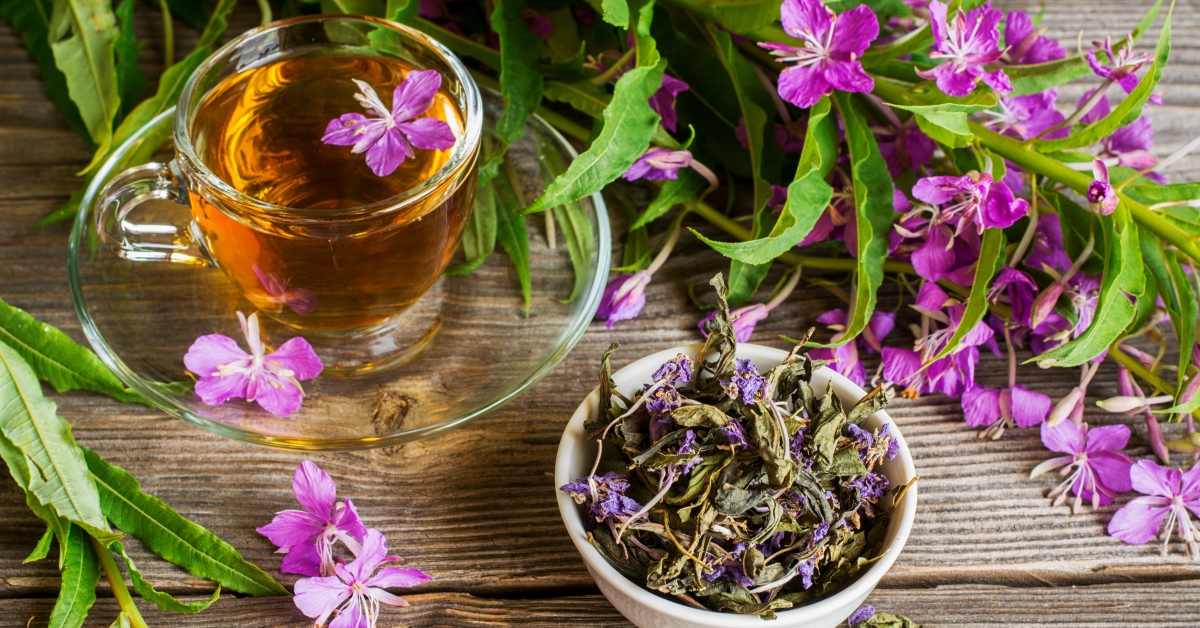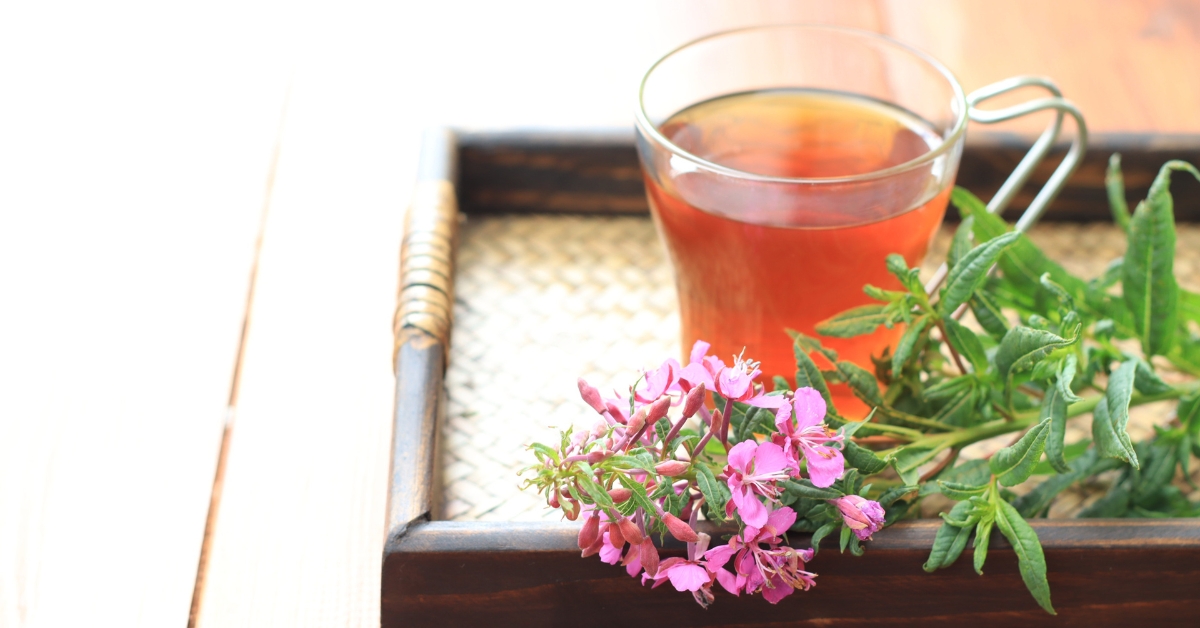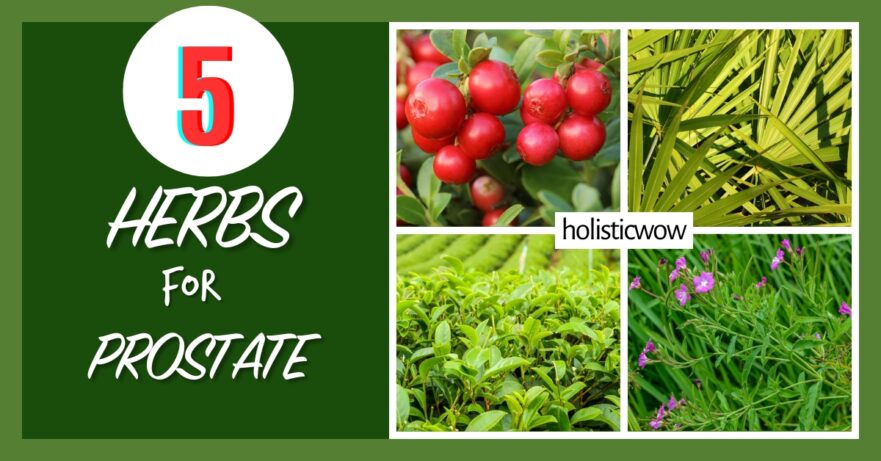In this article about herbs for prostate:
🌿 Best Herbs for a Healthy Prostate | 📜 Herbal Preparations and Recipes for Prostate Health | ☯️ Integrating Herbs into Daily Life for Prostate Health | 🌱 Navigating Herbs Safely
Prostate issues affect many men as they age, causing symptoms like frequent urination, weak urine flow, and nighttime bathroom trips. These problems can significantly impact daily life and overall well-being.
Certain herbs, including saw palmetto, stinging nettle, and green tea, have shown a potential to support prostate health. These natural remedies may help reduce inflammation, improve urinary symptoms, and promote overall prostate function.
Understanding these herbal options can help men make informed decisions about their prostate health. It’s important to consult a healthcare provider before starting any new herbal regimen, especially if you have existing health conditions or take medications.
Key Takeaways
- ✨ Saw Palmetto Benefits: Saw palmetto may help reduce inflammation and urinary symptoms in men with benign prostatic hyperplasia, but evidence is mixed.
- 🍃 Stinging Nettle Potential: Nettle root may improve urinary flow and reduce urinary frequency associated with prostate issues.
- 🍵 Green Tea Protection: Green tea contains antioxidants that may support prostate health, but more research is needed on its effects for benign prostatic hyperplasia (BPH).
- 🌿 Herbal Combination: Combining herbs like saw palmetto, stinging nettle, and cranberry may offer broader support for prostate health, but consult your healthcare provider before starting any new regimen.
🌿 Best Herbs for a Healthy Prostate
Prostate issues affect many men, especially as they age. Common symptoms include frequent urination, difficulty starting or stopping urination, weak urine flow, and the need to urinate at night. These signs often indicate an enlarged prostate, also known as benign prostatic hyperplasia (BPH). The prostate gland can grow larger due to hormonal changes and aging, leading to urinary tract problems and discomfort.
Several herbs have been traditionally used, though evidence for their effectiveness varies. These include saw palmetto (Serenoa repens), small-flowered willowherb (Epilobium parviflorum), stinging nettle (Urtica dioica), green tea (Camellia sinensis), and cranberries (Vaccinium macrocarpon).
BPH symptoms can significantly impact daily life, causing interrupted sleep, anxiety about finding bathrooms, and decreased quality of life. While not all men with an enlarged prostate experience severe symptoms, many seek natural ways to maintain prostate health and alleviate discomfort. However, it is important to consult healthcare providers before starting herbal supplements, as their effectiveness and safety may vary. Understanding these common prostate concerns helps in exploring evidence-backed herbal options that may offer support for overall prostate wellness and urinary function.
Saw palmetto (Serenoa repens)
Saw palmetto (Serenoa repens), used for centuries by Native Americans, is believed to support prostate health by inhibiting the enzyme 5-alpha-reductase, which converts testosterone to dihydrotestosterone (DHT), a hormone linked to prostate enlargement. However, evidence of its effectiveness for benign prostatic hyperplasia (BPH) is mixed. While smaller studies have shown some benefits for reducing urinary symptoms, such as frequent urination and weak urine flow, larger studies and reviews, including randomized controlled trials, have not consistently demonstrated significant improvements over placebo. It is generally well-tolerated, and its potential effects on prostate health, if any, may become noticeable after 6–8 weeks of regular use. However, results vary, and some men may not experience significant benefits.
Small-flowered willowherb (Epilobium parviflorum)
Small-flowered willowherb (Epilobium parviflorum) is an herb traditionally used in Europe for its potential benefits in supporting prostate health. This plant contains compounds like oenothein A and B, which have shown anti-inflammatory and antioxidant properties. These properties may help reduce inflammation in the prostate and alleviate urinary symptoms commonly associated with benign prostatic hyperplasia (BPH). Historically, small-flowered willowherb has been used as a remedy for prostate and urinary issues, and some early studies suggest it could be beneficial in managing BPH symptoms. One human study found that a multi-herb formula containing Epilobium parviflorum, among other ingredients, significantly reduced urinary symptoms over three months. However, more clinical research is needed to establish its full efficacy and how it compares to more widely used treatments like saw palmetto.
Stinging nettle (Urtica dioica)
Stinging nettle (Urtica dioica) is a perennial plant across North America, Europe, and Asia. Traditionally used for treating urinary issues, it has gained recognition for its potential benefits in managing benign prostatic hyperplasia (BPH). Studies suggest that stinging nettle root may help reduce prostate inflammation and improve urinary symptoms, such as increasing urinary flow and reducing residual urine volume. In a 6-month clinical trial, men with BPH who used stinging nettle showed significant improvements in urinary symptoms, such as fewer bathroom trips and easier urination, along with increased urine flow and a reduction in prostate size. Another study confirmed that nettle extract significantly improved urinary symptoms in men with BPH after 8 weeks of treatment, showing reductions in symptom severity compared to a placebo.
Green tea (Camellia sinensis)
Green tea (Camellia sinensis) is famous for its health benefits, thanks to its powerful antioxidants, especially epigallocatechin-3-gallate (EGCG). EGCG has strong antioxidant and anti-inflammatory properties. Research suggests that EGCG may help protect against prostate cancer by slowing cancer cell growth and interfering with cancer survival pathways. However, more studies are needed to fully understand how green tea may affect benign prostatic hyperplasia (BPH). Some research suggests that compounds like EGCG in green tea may help manage BPH by reducing inflammation and oxidative stress. While green tea is not a replacement for conventional treatments like medication or surgery, it holds promise as an additional support for prostate health. Adding green tea to your daily routine could be an easy way to support overall wellness, including prostate health. However, more human studies are needed to fully understand its long-term impact on managing BPH.
Cranberries (Vaccinium macrocarpon)
Cranberries (Vaccinium macrocarpon), known for their tart flavor, are native to North America and are often used to support urinary health. The active compounds in cranberries, called proanthocyanidins (PACs), help prevent bacteria from sticking to the walls of the urinary tract, reducing the risk of urinary tract infections (UTIs). This can be especially beneficial for men with prostate issues, as they are more prone to UTIs. Some research has also explored whether cranberries might help lower prostate-specific antigen (PSA) levels, which are used to monitor prostate health. A study in men with lower urinary tract symptoms (LUTS) showed that cranberry supplementation improved urinary symptoms and reduced PSA levels, but further research is needed to confirm these effects. Cranberries can be consumed as juice, supplements, or whole berries. They are generally safe, but men prone to kidney stones should be cautious due to the fruit’s oxalate content, which can contribute to stone formation. The evidence suggests that cranberries can support urinary health and may provide additional benefits for men with prostate concerns.
📜 Herbal Preparations and Recipes for Prostate Health
To support prostate health and address common urinary issues, these herbal tea recipes incorporate the potential benefits of selected herbs. Each blend aims to provide natural support for prostate wellness, offering potential relief and balance. These teas can offer a soothing herbal option for men concerned about their prostate health. Still, it’s important to note that while these herbs are traditionally used for prostate and urinary support, evidence is still evolving, and individual results may vary.

Mild Prostate Support Tea
Ingredients:
- 1 teaspoon dried saw palmetto berries
- 1 teaspoon dried stinging nettle root
- ½ teaspoon dried green tea leaves
- 1 cup of boiling water
Preparation:
- Combine all dried herbs in a teapot.
- Add 1 cup of boiling water and steep for 10-15 minutes.
- Strain and drink once daily, preferably in the morning, to support prostate health.

Urinary Flow Enhancement Blend
Ingredients:
- 1 teaspoon dried small-flowered willowherb
- 1 teaspoon dried stinging nettle leaf
- ½ teaspoon dried cranberry fruit
- 1 cup of boiling water
Preparation:
- Mix the herbs in a teapot.
- Pour boiling water over the herbs and steep for about 10 minutes.
- Strain and drink twice daily, morning and night, to help improve urinary flow and reduce frequency.

Prostate Comfort Tea
Ingredients:
- 1 teaspoon dried saw palmetto berries
- 1 teaspoon dried small-flowered willowherb
- ½ teaspoon dried green tea leaves
- ½ teaspoon dried stinging nettle root
- 1 cup of boiling water
Preparation:
- Place all dried herbs in a teapot, add boiling water, and steep for 15 minutes.
- Strain and drink once daily to support overall prostate comfort and urinary health.

Advanced Prostate Support Blend
Ingredients:
- 1 teaspoon dried stinging nettle root
- 1 teaspoon dried saw palmetto berries
- ½ teaspoon dried small-flowered willowherb
- ½ teaspoon dried green tea leaves
- ¼ teaspoon dried cranberry fruit
- 1 cup of boiling water
Preparation:
- Combine herbs in a teapot, cover with boiling water, and steep for 10-15 minutes.
- Strain and drink in the morning to support prostate health and urinary function.

Nighttime Prostate Calm
Ingredients:
- 1 teaspoon dried small-flowered willowherb
- 1 teaspoon dried stinging nettle leaf
- ½ teaspoon dried saw palmetto berries
- ½ teaspoon dried green tea leaves
- ½ teaspoon dried cranberry fruit
- 1 cup of boiling water
Preparation:
- Add all dried herbs to a teapot, pour in boiling water, and steep for 15 minutes.
- Strain and drink 1-2 hours before bedtime to support prostate health and potentially reduce nighttime urination.
These tea recipes are designed to be easily integrated into daily routines, providing a practical and enjoyable approach to potentially supporting prostate health naturally. While these herbs have traditional uses, their effectiveness may vary from person to person. It’s important to consult a healthcare provider before starting any new herbal regimen, especially if you are taking medications or have existing health conditions.
☯️ Integrating Herbs into Daily Life for Prostate Health
Incorporating herbs into your daily routine can support prostate health. Here are practical tips for using herbs effectively and complementary practices to maximize their benefits.
Daily Use and Lifestyle Integration
- 🫖 Herbal Teas: Start your day with a cup of herbal tea containing saw palmetto, small-flowered willowherb, or stinging nettle. These can become a calming morning ritual that may provide mild support for prostate health over time.
- 💚 Herbal Supplements: If you prefer not to drink herbal teas, consider taking saw palmetto, stinging nettle, or small-flowered willowherb in capsule or tincture form. These supplements are easy to incorporate into your daily routine. Be sure to follow recommended dosages, as exceeding them may not offer additional benefits and could increase the risk of side effects.
- ☕ Green Tea Consumption: Replace one of your daily beverages with green tea to benefit from its antioxidant properties. Aim for 2-3 cups per day. Green tea contains catechins, which have been studied for their antioxidant effects.
- 🧃 Cranberry Intake: Add a small handful of dried cranberries to your breakfast cereal or yogurt, or drink a glass of unsweetened cranberry juice daily. This may support urinary tract health by helping prevent bacterial adhesion in the urinary tract.
Additional Practices to Support Prostate Health
- 🍅 Dietary Adjustments: Incorporate foods that may support prostate health, such as tomatoes (rich in lycopene), pumpkin seeds (high in zinc), and fatty fish (which contain omega-3 fatty acids). These can complement the effects of herbal approaches. A balanced diet rich in antioxidants and essential nutrients is key to prostate and urinary health.
- 🏃♀️ Regular Exercise: Engage in moderate physical activity like brisk walking or swimming for at least 30 minutes daily. Regular exercise can help maintain a healthy weight and support overall prostate health. Exercise has been linked to improved immune function and reduced inflammation, which can benefit prostate health.
- 🧘♀️ Stress Management: Practice stress-reduction techniques like deep breathing exercises, meditation, or yoga. Managing stress may contribute to better overall health, including prostate health, though its direct impact on the prostate is not fully understood. Chronic stress can lead to inflammation, which may affect prostate function over time.
- 🫗 Hydration: Ensure adequate water intake throughout the day to support urinary health. Aim for 6-8 glasses of water daily unless otherwise advised by your healthcare provider. Staying well-hydrated can help flush the urinary tract and maintain optimal function.
- 🍻 Limit Alcohol and Caffeine: Reduce consumption of alcohol and caffeinated beverages, especially in the evening, as these can irritate the bladder and potentially worsen urinary symptoms. Alcohol and caffeine are known bladder irritants and may exacerbate urinary symptoms associated with prostate enlargement.
- 🧑⚕️ Regular Check-ups: Schedule regular prostate health check-ups with your healthcare provider. This is crucial for the early detection and management of prostate issues. Routine screenings, including PSA tests and digital rectal exams, are important for monitoring prostate health, particularly as men age.
🌱 Navigating Herbs Safely
Starting with small doses is the first step when adding herbal remedies to your health routine. This approach lets you see how you respond and adjust amounts for the best effect, keeping safety in mind. While many herbs are safe, everyone’s body reacts differently. If you notice any side effects, it’s important to stop and think about what might be causing them.
Remember, herbs can sometimes interact with prescription medicines. These interactions might make your medicines work too well or not well enough, so talking to a healthcare provider or an herbalist is essential. This is especially crucial if you’re pregnant, breastfeeding, taking medications regularly, or have an existing health condition. Getting advice tailored to your situation can help you avoid any unnecessary risks.
For kids and older adults, being extra careful with herbs is important. Their bodies might react more strongly to herbal remedies, and the chance of side effects or interactions could be greater. Before giving herbal treatments to children or elderly family members, getting advice from a professional is a must to ensure their safety.
By being cautious and seeking expert advice when needed, you can make herbal remedies a safe part of your wellness plan. This careful approach allows you to enjoy the benefits of herbs while keeping yourself and your family safe.
We explored natural herbal remedies for prostate health, focusing on several key herbs: saw palmetto, small-flowered willowherb, stinging nettle, green tea, and cranberries. These herbs have been traditionally used to support prostate function and manage symptoms of benign prostatic hyperplasia (BPH), such as frequent urination and weak urine flow.
While some studies suggest these herbs can be beneficial, there is mixed evidence for many of them. More research is needed to fully establish their efficacy and optimal use. We provided recipes for herbal tea blends to support prostate health and offers practical tips for incorporating these herbs into daily routines.
It’s important to note that herbal remedies should be used cautiously and in consultation with a healthcare provider, especially for those with existing health conditions or taking medications. Regular prostate check-ups remain crucial for early detection and management of prostate issues.
FAQ
What are the potential benefits of saw palmetto for prostate health?
Saw palmetto is a popular herb often used to support prostate health. This plant contains compounds that may help reduce symptoms associated with benign prostatic hyperplasia (BPH), a condition where the prostate gland becomes enlarged. Some potential benefits of saw palmetto may include improving urinary flow, reducing the frequency of nighttime urination, and decreasing urinary urgency. The herb is believed to work by inhibiting the enzyme 5-alpha-reductase, which is involved in the conversion of testosterone to dihydrotestosterone (DHT), a hormone linked to prostate enlargement. However, scientific evidence on saw palmetto's effectiveness is mixed, with some studies showing benefits while others do not demonstrate significant improvements over placebo.
Saw palmetto is generally well-tolerated, but it may take several weeks of consistent use to notice potential improvements in prostate-related symptoms. Side effects are usually mild and may include digestive upset, but serious side effects are rare. As with any herbal supplement, it's advisable to consult a healthcare provider before starting saw palmetto, especially if you have existing health conditions or are taking medications.
How does small-flowered willowherb support prostate health?
Small-flowered willowherb is an herb that has gained attention for its potential benefits in supporting prostate health. This plant contains compounds called oenothein A and B, which have demonstrated anti-inflammatory and antioxidant properties. These properties may help reduce prostate inflammation and alleviate urinary symptoms associated with benign prostatic hyperplasia (BPH). It is believed that small-flowered willowherb might work by inhibiting enzymes involved in hormonal processes that can contribute to prostate enlargement, such as 5-alpha-reductase and aromatase. However, the exact mechanism of action is not fully understood, and more research is needed to confirm these effects.
While preliminary studies suggest it may be beneficial for managing BPH symptoms, more robust research is needed to establish its efficacy conclusively. The herb is typically consumed as a tea or tincture, and some men report improvements in urinary flow and reduced frequency of urination with regular use. However, individual results may vary, and the herb should be used under the guidance of a healthcare provider, especially if you have existing health conditions or are taking medications.
Can green tea contribute to prostate health?
Green tea has gained recognition for its potential contributions to prostate health. This popular beverage contains polyphenols, particularly epigallocatechin-3-gallate (EGCG), which have potent antioxidant and anti-inflammatory properties. These compounds may show promise in protecting against prostate cancer and potentially reducing the risk of benign prostatic hyperplasia (BPH). However, while some studies suggest green tea catechins may inhibit the growth of prostate cancer cells in laboratory settings, more human studies are needed to confirm these effects in clinical practice.
While the evidence is still emerging, incorporating green tea into your daily routine can be a simple way to support overall wellness, including prostate health. It is important to note that green tea should not be considered a substitute for proven medical treatments for prostate conditions.
Additionally, green tea contains caffeine, so individuals sensitive to caffeine should be mindful of their intake, especially in the evening. As with any dietary change, it's advisable to consult a healthcare provider, particularly if you have existing health conditions or are taking medications.

